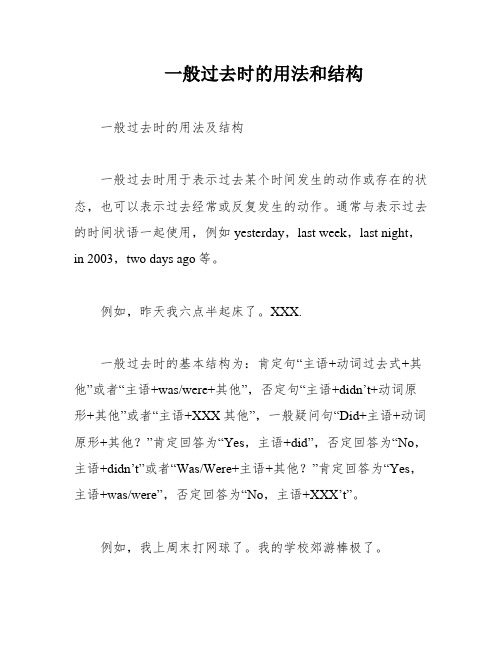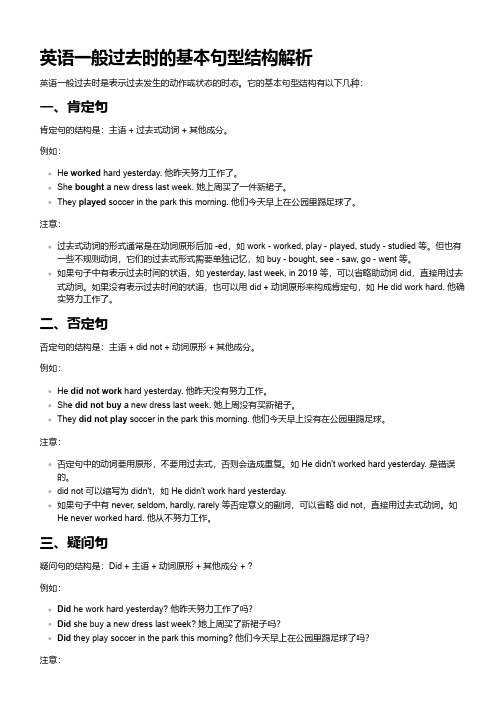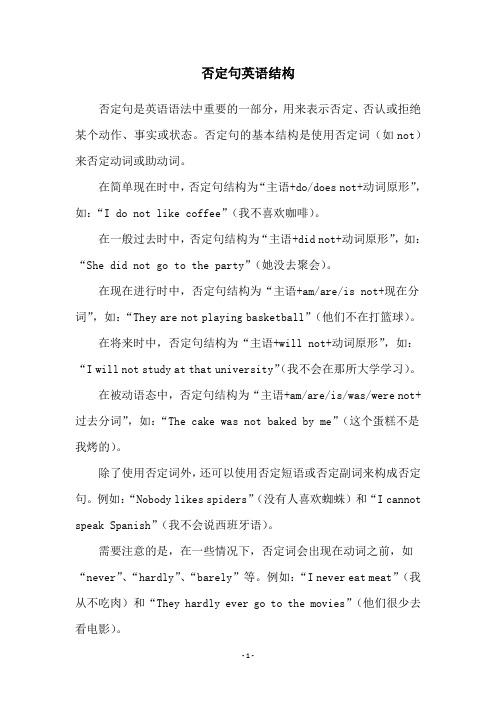一般过去式的否定句
一般过去时结构句型

一般过去时结构句型一般过去时(Simple Past Tense)是英语中用来表示过去已经发生的动作、事实或者状态的一种时态。
在一般过去时中,我们使用一般过去时的结构来描述过去的情况、事件或者动作。
一般过去时的结构包括肯定句、否定句和疑问句三种形式。
一、肯定句结构:1. 对于大多数动词,一般过去时的肯定句结构是主语 + 动词的过去式 + 其他成分。
例如: I studied English last night. 我昨晚学了英语。
She went to the park with her friends. 她和朋友们一起去了公园。
2. 如果动词是以辅音字母加“y”结尾的,一般过去时的肯定句结构是主语 + 动词的过去式 + 其他成分。
例如: He carried the bags for us. 他为我们提了包。
They played football in the park. 他们在公园踢足球。
3. 如果动词是以“e”结尾的,一般过去时的肯定句结构是主语 + 动词的过去式 + 其他成分。
例如: I danced at the party last night. 昨晚我在派对上跳舞。
She smiled when she saw the gift. 当她看到礼物时,她笑了。
二、否定句结构:一般过去时的否定句结构是主语 + did not (didn’t) + 动词原形 + 其他成分。
例如:I didn’t go to the cinema last weekend. 上个周末我没有去电影院。
They didn’t eat lunch at school yesterday. 昨天他们没在学校吃午饭。
三、疑问句结构:一般过去时的疑问句结构是 Did + 主语 + 动词原形+ 其他成分?例如: Did you watch the movie last night? 昨晚你看了电影吗?Did they visit their grandparents during the holidays? 假期期间他们去看望了爷爷奶奶吗?在使用一般过去时的时候,还需要掌握一些特殊情况下的用法和变化规则。
一般过去时的用法和结构

一般过去时的用法和结构一般过去时的用法及结构一般过去时用于表示过去某个时间发生的动作或存在的状态,也可以表示过去经常或反复发生的动作。
通常与表示过去的时间状语一起使用,例如yesterday,last week,last night,in 2003,two days ago等。
例如,昨天我六点半起床了。
XXX.一般过去时的基本结构为:肯定句“主语+动词过去式+其他”或者“主语+was/were+其他”,否定句“主语+didn’t+动词原形+其他”或者“主语+XXX其他”,一般疑问句“Did+主语+动词原形+其他?”肯定回答为“Yes,主语+did”,否定回答为“No,主语+didn’t”或者“Was/Were+主语+其他?”肯定回答为“Yes,主语+was/were”,否定回答为“No,主语+XXX’t”。
例如,我上周末打网球了。
我的学校郊游棒极了。
这个女孩昨天下午没玩电子游戏。
上星期五老XXX不高兴。
特殊疑问句的结构为:特殊疑问词+一般疑问句(顺序)?例如,XXX上周末干什么了?他去看了他的祖父母。
你昨天在哪儿?我在家里。
为了帮助记忆实义动词一般过去时的用法和结构,我们可以使用以下歌诀:“动词一般过去时,表示过去发生事。
谓语动词过去式,过去时间作标志。
否定形式很简单,主语之后加didn't。
谓语动词要还原。
疑问构成有规则,主语前面加did。
”过去式的构成有两种方式:be动词和实义动词。
系动词be的过去式有两种形式:was和were。
其中,was是am和is的过去式,were是are的过去式。
实义动词过去式的构成有以下几种规则:1.一般在动词末尾加-ed,例如walk→walked,play→played;2.以不发音e结尾的动词末尾只加-d,例如love→loved,decide→decided;3.以“辅音字母+y”结尾的动词,先将y变为i,再加-ed,例如study→studied,carry→carried;4.末尾只有一个辅音字母的重读闭音节,先双写该辅音字母,再加-ed,→ped,plan→planned。
各种时态的否定句

各种时态的否定句各种时态的否定句可以用以下方式构成:一般现在时的否定句:主语 + do not/does not + 动词原形例句:I do not like coffee.(我不喜欢咖啡。
)一般过去时的否定句:主语 + did not + 动词原形例句:She did not go to the party last night.(她昨晚没有去参加派对。
)一般将来时的否定句:主语 + will not + 动词原形例句:They will not come to the meeting tomorrow.(他们明天不会来参加会议。
)现在进行时的否定句:主语 + am/are/is + not + 动词-ing 形式例句:We are not watching TV right now.(我们现在不在看电视。
)过去进行时的否定句:主语 + was/were + not + 动词-ing 形式例句:He was not studying when I called him.(当我给他打电话时,他没有在学习。
)现在完成时的否定句:主语 + have/has + not + 过去分词例句:She has not finished her homework yet.(她还没有完成作业。
)过去完成时的否定句:主语 + had + not + 过去分词例句:They had not seen each other for a long time.(他们已经很久没有见面了。
)情态动词的否定句:主语 + 情态动词 + not + 动词原形例句:You should not eat too much junk food.(你不应该吃太多垃圾食品。
)希望以上回答能对您有所帮助。
一般过去时的否定句和疑问句

一般过去时的否定句和疑问句一般过去时的否定句(Negative Sentences in Simple Past Tense)一般过去时的否定句用于描述过去发生的事情中的否定情况。
构成一般过去时的否定句需要在动词前加上助动词 "did not" 或"didn't",并将动词本身保持原形。
以下是构成一般过去时的否定句的示例:1. 主语 + did not/didn't + 动词原形 + 其他成分- 例如:She did not/didn't go to the party last night.2. 主语 + did not/didn't + 动词原形 + 否定词 + 其他成分- 例如:I didn't see anyone in the park yesterday.需要注意的是,当动词本身为be动词时,不需要再使用助动词 "did"。
直接在be动词前加上 "not" 即可构成否定句。
例如:一般过去时的疑问句(Interrogative Sentences in Simple Past Tense)一般过去时的疑问句用于询问过去发生的事情。
构成一般过去时的疑问句需要将助动词 "did" 放在主语之前,并将动词本身保持原形。
以下是构成一般过去时的疑问句的示例:1. Did + 主语 + 动词原形 + 其他成分?- 例如:Did you study for the test yesterday?2. Did + 主语 + 动词原形 + 否定词 + 其他成分?- 例如:Did she not/didn't watch the movie last night?当动词本身为be动词时,同样需要将助动词 "did" 放在主语之前,形成疑问句。
一般过去时的基本结构

一般过去时的基本结构一1. 肯定句形式:主语+动词过去式+其他I was an English teacher one year ago. 一年前我是一名英语老师。
I bought a yellow dress yesterday afternoon. 昨天下午我买了一条黄裙子。
2. 否定句形式:①was/were+not; ②在行为动词前加didn't,同时还原行为动词I wasn't an English teacher one year ago. 一年前我不是一名英语老师。
I didn't buy a yellow dress yesterday afternoon. 昨天下午我没买一条黄裙子。
3. 一般疑问句:①was/were提到句首;②Did+主语+动词原形+其他?Were you an English teacher one year ago? 一年前你是一名英语老师吗?Did you buy a yellow dress yesterday afternoon? 昨天下午你买了一条黄裙子吗?4. 特殊疑问句:特殊疑问词+一般疑问句What were you one year ago? 一年前你是做什么的?When did you buy a yellow dress? 你什么时候买了一条黄裙子?一般过去时的基本用法二1. 表示在过去某个时间所发生的动作或所处的状态(与现在无关)。
常与yesterday, last week, in 1989, just now, a moment ago, the other day 等过去具体时间状语连用。
He was here just now. 他刚才还在这里。
What did you do yesterday? 你昨天做了什么事?2. 在过去一段时间内的经常性或习惯性动作。
We often played together when we were children. 我们小时候常在一起玩。
六年级英语一般过去时否定句单选题40题

六年级英语一般过去时否定句单选题40题1. Tom _________ play football yesterday.A. didn'tB. don'tC. doesn'tD. isn't答案:A。
本题考查一般过去时的否定形式。
一般过去时的否定句结构是“主语+ didn't + 动词原形”,A 选项“didn't”符合;B 选项“don't”用于一般现在时;C 选项“doesn't”用于一般现在时第三人称单数;D 选项“isn't”是be 动词的否定形式,不符合本题要求。
2. They _________ go to the zoo last weekend.A. didn'tB. don'tC. weren'tD. aren't答案:A。
此题考查一般过去时的否定表达。
一般过去时否定句用“didn't + 动词原形”,A 选项“didn't”符合,后面接动词原形“go”;B 选项“don't”用于一般现在时;C 选项“weren't”是be 动词的过去式否定形式,后面不能接动词原形;D 选项“aren't”是be 动词的现在时否定形式。
3. My mother _________ cook dinner yesterday.A. didn'tB. doesn'tC. don'tD. wasn't答案:A。
本题主要考查一般过去时的否定句。
一般过去时否定用“didn't + 动词原形”,A 选项“didn't”正确,后接动词原形“cook”;B 选项“doesn't”用于一般现在时第三人称单数;C 选项“don't”用于一般现在时;D 选项“wasn't”是be 动词的过去式否定形式,后面不能接动词原形。
一般过去时的否定句和特殊疑问句

一般过去时的否定句和特殊疑问句
过去时的否定句:
一般过去时表示过去发生的动作或状态。
在构成否定句时,在动词前加上“did not”,也可缩写为“didn't”。
以下是一些例句:
1. I did not go to work yesterday.(我昨天没有去上班。
)
2. They did not study for the test.(他们没有为考试学习。
)
3. She didn't like the movie.(她不喜欢这部电影。
)
4. We did not visit the museum.(我们没有参观博物馆。
)
5. He didn't play basketball last night.(他昨晚没有打篮球。
)
特殊疑问句:
特殊疑问句用于询问特殊信息,通常使用疑问词开头。
以下是一些例句:
1. Where did you go on your vacation?(你假期去哪里了?)
2. When did they arrive at the airport?(他们什么时候到达机场的?)
3. Why didn't she join us for dinner?(她为什么没和我们一起吃晚餐?)
4. How did they solve the problem?(他们是如何解决这个问题的?)
5. What did you buy at the grocery store?(你在杂货店买了什么?)
希望以上的信息能帮到您。
若有其他问题,请随时提问。
一般过去时的基本句型结构

英语一般过去时的基本句型结构解析英语一般过去时是表示过去发生的动作或状态的时态。
它的基本句型结构有以下几种:一、肯定句肯定句的结构是:主语 + 过去式动词 + 其他成分。
例如:He worked hard yesterday. 他昨天努力工作了。
She bought a new dress last week. 她上周买了一件新裙子。
They played soccer in the park this morning. 他们今天早上在公园里踢足球了。
注意:过去式动词的形式通常是在动词原形后加 -ed,如 work - worked, play - played, study - studied 等。
但也有一些不规则动词,它们的过去式形式需要单独记忆,如 buy - bought, see - saw, go - went 等。
如果句子中有表示过去时间的状语,如 yesterday, last week, in 2019 等,可以省略助动词 did,直接用过去式动词。
如果没有表示过去时间的状语,也可以用 did + 动词原形来构成肯定句,如 He did work hard. 他确实努力工作了。
二、否定句否定句的结构是:主语 + did not + 动词原形 + 其他成分。
例如:He did not work hard yesterday. 他昨天没有努力工作。
She did not buy a new dress last week. 她上周没有买新裙子。
They did not play soccer in the park this morning. 他们今天早上没有在公园里踢足球。
注意:否定句中的动词要用原形,不要用过去式,否则会造成重复。
如 He didn't worked hard yesterday. 是错误的。
did not 可以缩写为 didn't,如 He didn't work hard yesterday.如果句子中有 never, seldom, hardly, rarely 等否定意义的副词,可以省略 did not,直接用过去式动词。
小升初英语一般过去时否定句单选题50题

小升初英语一般过去时否定句单选题50题1. I ______ play football yesterday.A. didn'tB. don'tC. doesn'tD. wasn't答案:A。
本题考查一般过去时的否定形式。
一般过去时的否定句结构是“主语+ didn't + 动词原形”,A 选项“didn't”符合;B 选项“don't”是一般现在时的否定形式;C 选项“doesn't”是一般现在时第三人称单数的否定形式;D 选项“wasn't”是be 动词的否定形式,后接现在分词,不能接动词原形。
2. They ______ go to the zoo last weekend.A. didn'tB. don'tC. weren'tD. doesn't答案:A。
一般过去时的否定句用“didn't + 动词原形”,A 选项正确;B 选项“don't”是一般现在时否定形式;C 选项“weren't”后接现在分词,不能接动词原形;D 选项“doesn't”是一般现在时第三人称单数的否定形式。
3. She ______ do her homework last night.A. didn'tB. don'tC. doesn'tD. wasn't答案:A。
一般过去时的否定句结构为“主语+ didn't + 动词原形”,A 选项符合;B 选项“don't”用于一般现在时;C 选项“doesn't”用于一般现在时第三人称单数;D 选项“wasn't”后接现在分词,不符合要求。
4. We ______ have a party yesterday.A. didn'tB. don'tC. aren'tD. weren't答案:A。
小升初英语一般过去时否定句单选题50题

小升初英语一般过去时否定句单选题50题1.I ____ go to the park yesterday.A.didn'tB.don'tC.wasn'tD.am not答案:A。
本题考查一般过去时的否定句结构。
一般过去时的否定句是在动词前加didn't,后面动词用原形。
B 选项don't 用于一般现在时;C 选项wasn't 后面不能直接跟动词原形;D 选项am not 用于现在进行时或一般现在时。
2.She ____ watch TV last night.A.didn'tB.don'tC.wasn'tD.isn't答案:A。
一般过去时的否定句用didn't+动词原形。
B 选项don't 用于一般现在时;C 选项wasn't 后面不能直接跟动词原形watch;D 选项isn't 用于现在进行时或一般现在时。
3.We ____ play football on Sunday.A.didn'tB.don'tC.wasn't答案:A。
考查一般过去时的否定句。
didn't 后面加动词原形play。
B 选项don't 用于一般现在时;C 选项wasn't 后不能跟动词原形;D 选项aren't 用于现在进行时或一般现在时。
4.They ____ go swimming last week.A.didn'tB.don'tC.wasn'tD.aren't答案:A。
一般过去时的否定句结构为didn't+动词原形。
B 选项don't 用于一般现在时;C 选项wasn't 后面不能直接跟动词原形go;D 选项aren't 用于现在进行时或一般现在时。
5.He ____ read a book in the morning.A.didn'tB.don'tC.wasn'tD.isn't答案:A。
一般过去时的几种句型

III. 一般过去时的几种句型肯定句结构为:主语+动词的过去式+其它。
如:He went to the toy store yesterday. 他昨天去玩具店了。
否定句结构为:主语+did not (didn't)+动词原形+其它。
如:He didn't go to the toy store yesterday. 他昨天没去玩具店。
一般过去时的一般疑问句的构成:Did+主语+动词原形+其它?如:1) -Did you go to Beijing last week?-Yes, we did. (No, we didn't.)2) -Did you meet the businessman before?-No, I didn't. (Yes, I did.)一般过去时的特殊疑问句的构成:疑问词+did+主语+动词原形+其它?如:1) -What did you do last night?-I did my homework.2) -Where did you go last week?-I went to Shanghai with my parents.一般过去时口诀一般过去时并不难,表示过去动作、状态记心间。
动词要用过去式,时间状语句末站。
否定句很简单,didn't 站在动词原形前,其它部分不要变。
一般疑问句也好变,did放在句子前,主语、动词原形、其它部分依次站。
特殊疑问句也简单,疑问词加一般疑问句记心间。
最后一条请注意,动词过去式要牢记。
初学阶段要掌握的几个动词的过去式:watched TV, washed clothes, played football, cleaned the room, visited grandparents, went to a park, went swimming, read a book, went fishing, went hiking, learned Chinese, sang and danced, took pictures, climbed a mountain, ate good food, bought presents, rowed a boat, saw elephants, went skiing, went ice-skating.I.用所给的动词的适当形式填空。
一般过去时的否定句形式

一般过去时的否定句形式一般过去时是英语语法中最基础的过去式,表示在过去某一个时间内发生的动作或状态。
它是英语学习中必须掌握的语法内容之一。
在英语中,否定句形式的构造与肯定句形式有所不同。
下面,本文将为大家介绍一般过去时的否定句形式及其构造。
一、构造与例句一般过去时的否定句由“did not +动词原形”构成。
“did”是过去式助动词的缩写形式,不同于肯定句中的“did”相连。
下面我将举例说明:1. 肯定句:I went to America last year.(我去年去过美国。
)2. 否定句:I did not go to America last year.(我去年没去过美国。
)注意:在一般过去时的否定句中,“did not”缩写为“didn't”,即:“I didn't go to America last year."二、规则在构造一般过去时的否定句时,需要注意如下几点:1. 动词原形不同于现在时态使用动词原形“go”,在过去时态的否定句中我们也需要使用动词原形“go”,而不是过去分词“gone”。
2. 句式结构在一般过去时态的否定句中,did后需加not(缩写为“didn't”),而肯定句则省略not。
3. 所有人称的动词所有人称的动词在否定句中无需加s/es。
4. 陈述式形式一般过去时的否定句形式为“S + did not + 动词原形”。
三、常用的否定句词组在构造一般过去时的否定句时,常用以下的否定句词组,例如:1. didn’t (did not) 未做2. wasn’t (was not) 不是3. didn’t have (did not have) 没有4. didn’t mean (did no t mean) 没有意思5. didn’t think (did not think) 没有想到6. didn’t realize (did not realize) 没有认识到7. didn’t want (did not want) 不想要四、实例分析以下是一个实例分析,表达了一个人曾经遇到改变他生命的事情,但是他错过了它。
否定句英语结构

否定句英语结构否定句是英语语法中重要的一部分,用来表示否定、否认或拒绝某个动作、事实或状态。
否定句的基本结构是使用否定词(如not)来否定动词或助动词。
在简单现在时中,否定句结构为“主语+do/does not+动词原形”,如:“I do not like coffee”(我不喜欢咖啡)。
在一般过去时中,否定句结构为“主语+did not+动词原形”,如:“She did not go to the party”(她没去聚会)。
在现在进行时中,否定句结构为“主语+am/are/is not+现在分词”,如:“They are not playing basketball”(他们不在打篮球)。
在将来时中,否定句结构为“主语+will not+动词原形”,如:“I will not study at that university”(我不会在那所大学学习)。
在被动语态中,否定句结构为“主语+am/are/is/was/were not+过去分词”,如:“The cake was not baked by me”(这个蛋糕不是我烤的)。
除了使用否定词外,还可以使用否定短语或否定副词来构成否定句。
例如:“Nobody likes spiders”(没有人喜欢蜘蛛)和“I cannot speak Spanish”(我不会说西班牙语)。
需要注意的是,在一些情况下,否定词会出现在动词之前,如“never”、“hardly”、“barely”等。
例如:“I never eat meat”(我从不吃肉)和“They hardly ever go to the movies”(他们很少去看电影)。
掌握否定句结构是学习英语的重要一步,可以帮助你更准确地表达自己的想法和意见。
一般过去式的否定句

一般过去式的否定句1.动词是Be动词时,一般过去时的否定式是在be动词后加not。
句型:主语+wasn’t/weren’t…I was in Beijing yesterday. We were in Beijing yesterday.否定句:I wasn’t in Beijing yesterday. We weren’t in Beijing yesterday.练习( ) 1. It ____________ (not be) Ben's birthday last Friday.A. wasn’tB. weren’tC. isn’tD. aren’t( ) 2. These men_________________ (not be) firemen a week ago.A. wasn’tB. weren’tC. not beD. aren’t( ) 3. They _____________ (not be) in Beijing three days ago.A. wasn’tB. weren’tC. not isD. aren’t( ) 4. It ____________ (not be) the 2nd of November yesterday.A. wasn’tB. weren’tC. not areD. aren’t2.动词是行为动词时,一般过去时的否定式是在动词原形前加助动词did not (didn’t). 句型:主语+didn’t+动词原形I told them the news yesterday.否定句:I didn’t tell them the news yesterday.练习1. Miss Guo ______________ (not get) up late the day before yesterday.2. We all ______________ (not have) a good time three days ago.3. She _____________ (not find) a beautiful butterfly just now.4. I ____________ (not watch) a cartoon yesterday evening.5. Her father ___________ (not read) a newspaper last night.行为动词一般过去时的疑问式一、一般过去式的一般疑问句:1.有be动词时,把be动词提前句型:Was+主语+…? / Were+主语+ … ?There were three cups of tea on the table just now.一般疑问句:Were there three cups of tea on the table just now?Yes, there was. No, t here wasn’t.1. There were some oranges in the cup.(变一般疑问句)_________ there ___________ orange in the cup?2. It was Monday yesterday. (变一般疑问句)_________ it Monday yesterday?3. Mary and Mike were in Shanghai last month. (变一般疑问句)_________ Mary and Mike in Shanghai last month.2.动词是行为动词时,在句首加助动词didDid+主语+动词原形+其他?They finished their work at four.一般疑问句:Did they finish their work at four? Yes, they did. No, they didn’t. Exercises(练习):1._______ he ______ (go) to that morning? Yes, he _____.2._________your brother ___________(find) some meat in the fridge(冰箱). No, he _________.3.________ Mary _______ (read) an interesting book about history? Yes, she __________.4.________ the students of Class Six _________(have) an English lesion the day before yesterday? No, they didn’t.二、一般过去时的特殊疑问式1.动词是行为动词时: 疑问词+did+主语+动词原形……?A B对划线部分提问: A:What did they do at four?B:When did they finish their work?Exercises(练习):1. ________ _________ they __________ to park yesterday?2. ________ did they_________ yesterday evening?3. ________ did her sisters _________kites last Friday? ________ shirt did you ________ in the past.2.有be动词时: 疑问词+ was/were+主语+其他?A B对划线部分提问: A: Who was in the classroom just now?B: Where was Jack just now?1. ________ ________ Mary and Peter five days ago?2. _______ ________ teacher _______ there in the office?3. _______ ________ he in the past?4. ________ _________ a teacher in the past?. .。
一般过去式否定句

一般过去式否定句
一般过去式否定句是在动词后面加上"did not"或"didn't",表示过去某个时间点或一段时间内的否定情况。
以下是一些例子:
1. 他昨天没有去学校。
2. 我们上个月没有参加聚会。
3. 她从来没有见过那个人。
4. 我小时候不喜欢吃蔬菜。
5. 他不擅长弹钢琴。
6. 昨晚我没有看电视。
7. 他们从来没有在外地工作过。
8. 她不曾拥有过一只宠物。
9. 我们在那个地方没有找到任何线索。
10. 这本书没有吸引我的注意力。
提示:以上例句中,动词后都加上了"没有"表示否定的含义。
小升初英语一般过去时否定句练习题50题

小升初英语一般过去时否定句练习题50题1.I didn't go to school yesterday.A.I not go to school yesterday.B.I no go to school yesterday.C.I didn't went to school yesterday.答案:I didn't go to school yesterday. 本题考查一般过去时否定句的正确构成。
一般过去时否定句的构成是主语+didn't+动词原形。
选项A 和B 的表达错误,不符合语法规则。
选项C 中didn't 后面应该用动词原形go,而不是went。
2.She didn't eat an apple last night.A.She no eat an apple last night.B.She not eat an apple last night.C.She didn't ate an apple last night.答案:She didn't eat an apple last night. 一般过去时否定句结构为didn't+动词原形。
选项A 和B 错误,不符合语法。
选项C 中didn't 后应用动词原形eat,而不是ate。
3.We didn't play football on Sunday.A.We no play football on Sunday.B.We not play football on Sunday.C.We didn't played football on Sunday.答案:We didn't play football on Sunday. 一般过去时否定句是didn't+动词原形。
选项A 和B 错误,不符合语法要求。
选项C 中didn't 后应接动词原形play,而非played。
- 1、下载文档前请自行甄别文档内容的完整性,平台不提供额外的编辑、内容补充、找答案等附加服务。
- 2、"仅部分预览"的文档,不可在线预览部分如存在完整性等问题,可反馈申请退款(可完整预览的文档不适用该条件!)。
- 3、如文档侵犯您的权益,请联系客服反馈,我们会尽快为您处理(人工客服工作时间:9:00-18:30)。
一般过去式的否定句
1.动词是 Be 动词时,一般过去时的否定式是在be 动词后加 not。
句型:主语 +wasn’t/weren ’t ⋯
I was in Beijing yesterday. We were in Beijing yesterday.
否定句:I wasn’t in Beijing yesterday. We weren’t in Beijing yesterday.练习
( ( ( () 1. It ____________ (not be) Ben's birthday last Friday.
A. wasn’t
B. weren’t
C. isn’t
D. aren’t
) 2. These men_________________ (not be) firemen a week ago.
A. wasn ’ t
B. weren’ t
C. not be
D. aren’t
) 3. They _____________ (not be) in Beijing three days ago.
A. wasn ’ t
B. weren’ t
C. not is
D. aren’t
) 4. It ____________ (not be) the 2nd of November yesterday. A. wasn ’ t B. weren’ t C. not are D. aren’t
2.动词是行为动词时,一般过去时的否定式是在动词原形前加助动词did not (didn ’句t)型.:主语 +didn ’t+动词原形
I told them the news yesterday.
否定句: I didn ’t tell them the news yesterday.
练习
1.Miss Guo ______________ (not get) up late the day
before yesterday.
2.We all ______________ (not have) a good time three days ago.
3.She _____________ (not find) a beautiful butterfly just now.
4.I ____________ (not watch) a cartoon yesterday evening.
5.Her father ___________ (not read) a newspaper last night.
行为动词一般过去时的疑问式
一、一般过去式的一般疑问句:
1.有 be 动词时,把 be 动词提前
句型: Was+主语 +⋯? / Were+主语 + ⋯?
There were three cups of tea on the table just now.
一般疑问句 :Were there three cups of tea on the table just now?
Yes, there was. No, there wasn’ t.
1. There were some oranges in the cup(.变一般疑问句 )
_________ there ___________ orange in the cup?
2. It was Monday yesterday. (变一般疑问句 )
_________ it Monday yesterday?
3. Mary and Mike were in Shanghai last month. (变一般疑问句 )
_________ Mary and Mike in Shanghai last month.
2.动词是行为动词时,在句首加助动词did
Did+ 主语 +动词原形 +其他?
They finished their work at four.
一般疑问句 :Did they finish their work at four? Yes, they did. No, they didn ’ t. Exercises(练习 ):
1._______ he ______ (go) to that morning? Yes, he _____.
2._________your brother ___________(find) some meat in the fridge (冰箱) . No, he _________.
3.________ Mary _______ (read) an interesting book about history? Yes, she __________.
4.________ the students of Class Six _________(have) an English lesion the day before yesterday? No, they didn’ t.
二、一般过去时的特殊疑问式
1.动词是行为动词时 : 疑问词 +did+ 主语 +动词原形⋯⋯?
A B
对划线部分提问 : A:What did they do at four?
B:When did they finish their work?
Exercises(练习 ):
1.________ _________ they __________ to park yesterday?
2.________ did they_________ yesterday evening?
3.________ did her sisters _________kites last Friday? ________ shirt did you ________ in the past.
2.有 be 动词时 : 疑问词 + was/were+主语 +其他?
A B
对划线部分提问 : A: Who was in the classroom just now?
B: Where was Jack just now?
1.________ ________ Mary and Peter five days ago?
2._______ ________ teacher _______ there in the office?
3._______ ________ he in the past?
4.________ _________ a teacher in the past?。
